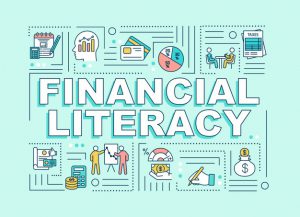
- How much of the knowledge imparted during the school years is never going to be used by an individual? For example, how likely is it that a future car sales executive is going to really use what she learned about the Byzantines in school?
- Everyone uses money, but why do a lot of people receive a little or no education regarding how to manage their personal wealth, credit performance and retirement planning?
Given a practical thought, a lot of hours spent on learning what we learnt during our school days, can start to seem futile when we complete school knowing not much about what we are really going to need in the 21st century life.
Join us at CashAmericaToday as we take a look at what financial literacy is and why it is really important today. For those of you who are new to our services, we are a leading direct lender of loans, providing short term personal loans to borrowers including those with a poor credit history.
What is Financial Literacy?
Financial literacy is the basic understanding of how finance works. Essentially this shall relate to personal finances and topics related to finance that directly or significantly affect one’s personal finances.
Financial literacy can include (but is not limited to):
- Understanding how to budget one’s finances
- Understanding savings and investment
- Understanding the basics of the credit system and debt repayment
- A basic understanding of the laws that govern finance – particularly those that relate
- A basic understanding of one’s income, expenses, savings, preparedness for emergencies and retirement, outstanding debts, assets and other basic financial health indicators
- A basic understand of taxes
- Some individuals may also include in this subject, the basic understanding of profit, loss, growth, de-growth, appreciation, depreciation and inflation.
Why is Financial Literacy Important?
Imagine trying to take part in a running race without knowing where the start and finish lines are. Now imagine that there’s no way to see your opponents’ progress while it is a competition. And then imagine that there are also hurdles that you were unaware of until they popped up while you were already running.
This is the situation that an adult faces in a real life on a daily basis, while just trying to make a living, while not being financially literate. While a small percentage still manage to run well, pass all the hurdles and perform well, that percentage is very small. The vast majority fall many times over.
One of the key indicators of personal financial health is a “credit score”. In the US, over 50% of the adult permanent residents and citizens have an unhealthy credit score (as in October, 2020). A poor credit score makes borrowing loans, renting houses, getting jobs and many other important tasks much harder. This is hence a strong reflection upon the poor understanding of finance that the vast majority of global population suffers from.
For a quick reference, here’s an article explaining briefly about the credit score and how to improve it.
A financially literate individual shall be able to:
- Understand one’s income and how to use it wisely
- Understand how to save and how much of the income needs to be saved
- Understand where to invest money, how much to invest and estimate what level of risk and returns are healthy
- Stay away from most financial frauds
- Make good decisions in comparison shopping
- Know how to manage risks, emergencies and retirement through the use of savings, insurance and financial planning
- Understand credit score and its importance
- Manage one’s credit score and check credit reports regularly for accuracy
- Choose right debt products as per their requirement and take advantage of the debt and lending system
- Remain confident while dealing with situations that involve finances
Since money and its need is indispensable, it is fairly easy to reflect upon the importance of financial literacy. Unfortunately, most of the school education systems across the globe skip this essential part of education. It is hence safe to say that an individual’s focus on working towards financial literacy is even more significant.
Where can One Start?
With regards to understanding personal finances, a good topic to start from, is the basics of finance. This can be followed by understanding the basics of investing, which can then be followed by gaining an insight on credit scores.
In the section below, we share links from reliable sources, which shall help any reader interested in getting started with understanding personal finances.
Further Reading
- Why Financial Literacy and Education are so Important – Investopedia
- What is Financial Literacy and Why is it Important – Experian
- How to Become a Self-Taught Finance Expert – Investopedia
- William Ackman: Everything You Need to Know About Finance and Investing in Under an Hour | Big Think – YouTube
- How Credit Scores Work – The Balance
- 10 Things Everyone should Know about Credit Scores – Credit.com